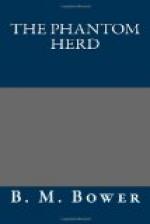The next day he did not talk with the men whose elbows he touched in the passing intimacy of travel; though Luck was a companionable soul who was much given to talking and to seeing his listeners grow to an audience,—an appreciative audience that laughed much while they listened and frowned upon interruption. Instead, he sat silent in his seat, since on this train there was no observation car, and he stared out of the window without seeing much of what passed before his eyes, and made notes now and then, and covered all the margins of his time-table with figures that had to do with film. Once, I know, he blackened his two front teeth with pencil tappings while he visualized a stampede and the probable amount of footage it would require, and debated whether it should be “shot” with two cameras or three to get scenes from different angles. A stampede it should be,—a real stampede of fear-frenzied range cattle in the mad flight of terror; not a bunch of galloping tame cows urged to foreground by shouting and rock-throwing from beyond the side lines of the scene. It would be hard to get, and it could not be rehearsed before the camera was turned on it. Luck decided that it should be shot from three angles, at least, and if he could manage it he would have a “panoram” of the whole thing from a height.
The porter came apologetically with his big whisk broom and told Luck that they would all presently be gazing at Dry Lake, or words which carried that meaning. So Luck permitted himself to be whisked from a half dollar while his thoughts were “in the field” with his camera men and company, shooting a real stampede from various angles and trying to manage so that the dust should not obscure the scene. After a rain—of course! Just after a soaking rain, he thought, while he gathered up his time-table and a magazine that held his precious figures, and followed the porter out to the vestibule while the train slowed.
It was in this mood that Luck descended to the Dry Lake depot platform and looked about him. He had no high expectation of finding here what he sought. He was simply making sure, before he left the country behind him, that he had not “overlooked any bets.” His mind was open to conviction even while it was prepared against disappointment; therefore his eyes were as clear of any prejudice as they were of any glamour. He saw things as they were.
On the side track, then, stood a string of cars loaded with wool, as his nose told him promptly. Farms there were none, but that was because the soil was yellow and pebbly and barren where it showed in great bald spots here and there; you would not expect to raise cabbages where a prairie dog had to forage far for a living. Behind the depot, the prairie humped a huge, broad shoulder of bluff wrinkled along the forward slope of it like the folds of a full fashioned skirt. There, too, the soil was bare,—clipped to the very grass roots by hundreds upon hundreds of hungry sheep whose wool, very likely, was crowding those cars upon the siding. Luck wasted neither glances nor thought upon the scene. Dry Lake was like many, many other outworn “cow towns” through which he had passed; changed without being bettered; all of the old life taken out of it in the process of its taming.




